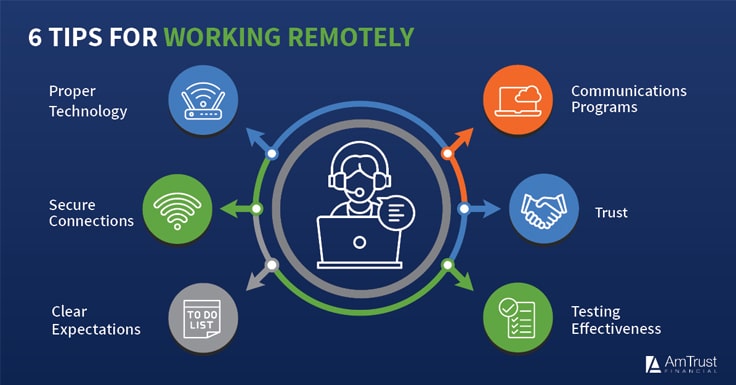Benefits of Remote Working
In today’s fast-paced and interconnected world, remote working has become increasingly prevalent. With advancements in technology and the changing dynamics of the modern workplace, more and more companies are embracing remote work as a viable option for their employees. In this article, we will explore the numerous benefits of remote working and how it can positively impact both individuals and organizations.
Increased Flexibility and Work-Life Balance
One of the key advantages of remote working is the flexibility it offers. By eliminating the need for physical office space, employees have the freedom to work from anywhere, be it their home, a coffee shop, or even while traveling. This flexibility allows individuals to create a work environment that suits their needs and preferences, ultimately leading to increased productivity and job satisfaction.
Remote working also promotes a healthier work-life balance. Without the constraints of commuting and rigid office hours, employees have more time and energy to allocate to their personal lives. This balance not only reduces stress and burnout but also enables individuals to pursue their hobbies, spend quality time with loved ones, and take care of their physical and mental well-being.
Improved Productivity and Performance
Contrary to common misconceptions, remote working has been proven to enhance productivity and performance. With the absence of office distractions and the ability to customize their work environment, remote employees often experience fewer interruptions and can focus better on their tasks. Additionally, remote workers have the flexibility to work during their most productive hours, which can lead to higher-quality output.
Remote working also eliminates the time wasted on commuting, which can significantly increase productivity. Studies have shown that employees who work remotely tend to work longer hours and take fewer breaks, resulting in higher overall productivity levels. Moreover, remote workers have the freedom to create a personalized work setup that optimizes their comfort and efficiency, further boosting their performance.
Cost Savings for Individuals and Organizations
Remote working offers substantial cost savings for both individuals and organizations. For employees, remote work eliminates commuting expenses, such as transportation costs and parking fees. It also reduces spending on professional attire and meals outside the home. These savings can add up significantly over time, contributing to improved financial well-being.
From an organizational perspective, remote working can lead to substantial cost reductions. Companies can save on expenses related to office space, utilities, and maintenance. Additionally, remote work allows organizations to tap into a global talent pool, eliminating the need for relocation packages and associated costs. By embracing remote work, companies can allocate their resources more efficiently and invest in other areas of growth and development.
Increased Employee Satisfaction and Retention
Remote working has a positive impact on employee satisfaction and retention rates. By offering the flexibility to work remotely, organizations demonstrate trust and respect for their employees, resulting in higher job satisfaction levels. Employees who have the freedom to manage their own schedules and work environment are more likely to feel empowered and motivated.
Furthermore, remote working can attract and retain top talent. In today’s competitive job market, the ability to work remotely is highly sought after by many professionals. By providing remote work options, companies can attract a diverse range of skilled individuals who may not be geographically located near the office. This expanded talent pool can lead to increased innovation, creativity, and overall success for the organization.

Remote working offers numerous benefits for both individuals and organizations. The increased flexibility, improved work-life balance, enhanced productivity, and cost savings make it an attractive option for many. By embracing remote work, companies can create a positive and empowering work culture while attracting and retaining top talent. As technology continues to advance, remote working is likely to become even more prevalent, shaping the future of work as we know it.
Frequently Asked Questions
1. What are the benefits of remote working?
Remote working offers several advantages such as:
Increased flexibility in work schedule
Elimination of commuting time and costs
Improved work-life balance
Reduced stress levels
Access to a wider job market
2. Can remote working increase productivity?
Yes, remote working can enhance productivity due to:
Minimized distractions and interruptions
A comfortable and personalized work environment
Reduced office politics and conflicts
Increased autonomy and self-motivation
3. Are there financial benefits to remote working?
Absolutely! Remote working can lead to:
Savings on commuting expenses
Reduced costs for work-related clothing
Potential tax deductions for a home office
Lower expenses on eating out or buying lunch
4. Does remote working improve work-life balance?
Yes, remote working can greatly enhance work-life balance by:
Allowing more time for personal and family commitments
Providing the flexibility to schedule breaks and exercise
Reducing the need for extensive childcare arrangements
Eliminating long hours spent in traffic
5. Can remote working reduce stress levels?
Indeed! Remote working can help in reducing stress by:
Minimizing exposure to office politics and conflicts
Providing a quieter and more peaceful work environment
Allowing for better work-life balance
Reducing the pressure of commuting in heavy traffic
6. Does remote working offer better job opportunities?
Yes, remote working can open up a wider job market by:
Allowing access to job opportunities in different locations
Removing geographical limitations
Enabling individuals to work for international companies
Offering more options for freelancing and self-employment
7. Can remote working lead to better work-life integration?
Absolutely! Remote working can promote work-life integration by:
Allowing individuals to blend work and personal life more seamlessly
Providing the flexibility to attend personal events during the day
Enabling individuals to create their work routines
Reducing the need for strict separation between work and personal time
8. Are there any downsides to remote working?
While remote working has numerous benefits, it also has some challenges:
Potential feelings of isolation or loneliness
Difficulty in separating work and personal life
Increased reliance on technology for communication
Lack of face-to-face interaction with colleagues
9. Can remote working enhance employee satisfaction?
Yes, remote working can significantly increase employee satisfaction by:
Providing a better work-life balance
Offering more autonomy and flexibility
Reducing commuting-related stress
Allowing individuals to work in a preferred environment
10. Does remote working contribute to environmental sustainability?
Indeed! Remote working has positive environmental impacts by:
Reducing carbon emissions from commuting
Lowering energy consumption in office buildings
Minimizing paper waste through digital documentation
Decreasing traffic congestion and air pollution




